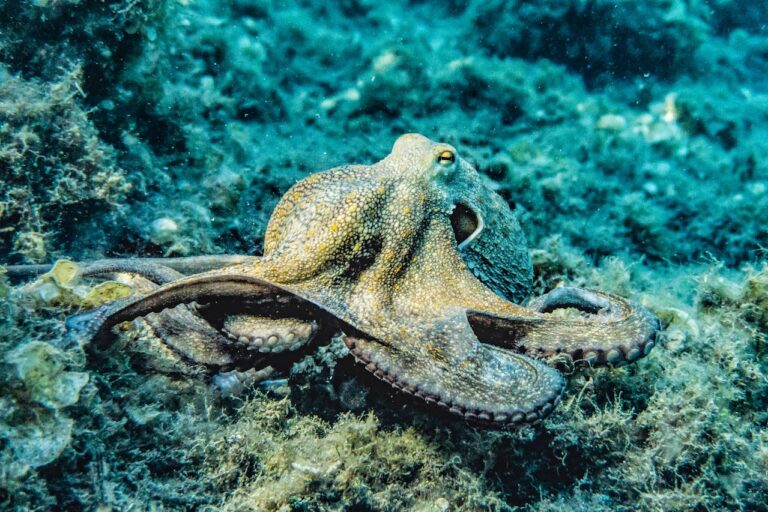What if I told you one of Earth’s most intelligent beings was a creature with eight arms, three hearts, and blue blood? Sounds like something out of science fiction, right? But this is the octopus—a captivating marine marvel whose intelligence continues to intrigue scientists, educators, and ocean enthusiasts alike.
Octopuses are more than just gelatinous creatures scuttling along the seafloor; they are thinkers, problem-solvers, and escape artists with minds as mysterious as the deep seas they inhabit. This blog dives into what makes our eight-limbed friends so incredibly intelligent, the evolutionary quirks that shaped their cognition, their critical role in marine ecosystems, and why understanding their unique minds matters.
Are you ready to be inspired by the brilliance that hides beneath the waves?
Evolutionary History Behind Octopus Intelligence
How did octopuses develop such impressive smarts? To appreciate their intelligence, we’ve got to rewind time—millions of years back. Octopuses belong to a group of molluscs called cephalopods, which also includes squid and cuttlefish. While many molluscs, like snails, opted for protective shells, cephalopods took a different route—giving up their hard shells in exchange for agility and adaptability.
Without a shell for defence, octopuses were forced to evolve other means of survival. This vulnerability may have sparked their unique intelligence. Their ability to solve problems, escape predators, and even mimic the environment stems from their need to adapt quickly in predator-rich habitats. It’s a story of nature’s incredible trade-offs—shed armour, gain a sharper mind.
Did You Know This About Octopus Intelligence?
Octopuses often get compared to cats or two-year-old toddlers when it comes to intelligence—an odd comparison, but one that paints a picture of their cognitive capabilities! Here’s what makes them mental giants in the marine world:
1. Problem-Solving Geniuses
Octopuses are masters of problem-solving. They’ve been observed opening jars to access food, navigating mazes, and even escaping aquariums by unscrewing lids or sliding through impossibly narrow gaps. One famous octopus, named “Houdini,” escaped multiple enclosures, gaining quite a reputation at his marine facility.
What’s more interesting? They don’t rely solely on trial and error; they learn. Researchers have documented octopuses watching other octopuses solve puzzles and mimicking their behaviour—a sign of observational learning not commonly found in non-mammalian species. That’s next-level problem-solving.
2. Memory for Days (or Years!)
Anyone who’s spent time around an octopus will tell you they can remember individuals—both human and octopus. They can differentiate between people who interact with them kindly and those who don’t. While their lifespan is relatively short (most live less than five years), studies suggest that they invest heavily in learning and memory during that time.
3. Camouflage and Tactical Deception
Imagine being able to disappear in plain sight—octopuses excel at this. With specialized skin cells called chromatophores, they can instantly change their colour and texture to blend with their surroundings. But here’s the catch—they use this ability strategically. Scientists believe octopuses process environmental cues to determine the most effective disguise to avoid detection. It’s like having the ultimate invisibility cloak, with a brain capable of deciding when and how to use it.
4. Independent Thinking Arms
Here’s a mind-bender for you—each octopus arm functions semi-independently. The neurons in their arms can “think” for themselves, even solving tasks like opening shellfish without requiring instructions from the central brain. That’s eight problem-solvers working at once. Makes multitasking look primitive in comparison, doesn’t it?
Octopus Ecosystems and Their Impact on Underwater Worlds
Octopuses aren’t just fascinating for their smarts—they play vital roles in marine ecosystems. These creatures are both predators and prey, helping to maintain balance in their food chains.
Predators Extraordinaire
Octopuses are stealthy hunters, preying on crabs, fish, and shellfish. Their presence keeps certain populations in check, preventing overgrazing of underwater habitats like coral reefs.
The Prey Becomes the Hero
Despite their cleverness, octopuses are on the menu for many species, such as sharks, dolphins, and eels. Their predators, in turn, help sustain larger oceanic ecosystems. It’s a finely tuned balance and a reminder of how interconnected marine life truly is.
Experiments That Blew Our Minds
Science loves a curious subject—and octopuses deliver. Over the decades, experiments have uncovered their cognitive wonders:
- Jar Experiments: Researchers place food inside sealed jars. Octopuses figure out how to unscrew lids quicker each time they try. Some even inspect the jar before acting, demonstrating foresight.
- Human Recognition Studies: Octopuses in aquariums recognize individual caretakers and react differently to different people. Yep, they might like one zookeeper while quietly disliking another.
These experiments reaffirm what we’ve always suspected—the octopus mind doesn’t just react; it strategies.
Why Protect Octopuses? Ethical Considerations and Conservation
It feels ironic, doesn’t it? The more we learn about their intelligence, the harder it is to ignore the ethical dilemmas surrounding their protection. Octopuses are still caught for consumption, used in research, and kept in entertainment environments that may not be ideal for their well-being.
Marine conservation efforts are stepping up, focusing not just on species like whales and turtles but on cephalopods too. By protecting their habitats from pollution, overfishing, and climate change, we ensure that the brilliance of octopuses isn’t lost to future generations.
Feeling inspired yet? There’s so much we can do—from reducing seafood waste to supporting marine conservation organizations. Even becoming more mindful about our ocean impact counts.
Share the Wonder of the Deep
Octopuses are more than marine animals—they are a gateway to understanding intelligence in its many forms. They remind us how life on our planet can evolve in extraordinary ways, adapting to challenges and thriving in the most creative manner.
If you’ve got a newfound appreciation for these eight-armed geniuses, consider this your chance to act. Support marine conservation efforts or share this post with others who’d love to learn about the brilliance of the deep.
The next time you see an octopus, whether in a documentary or on a snorkelling adventure, take a moment to appreciate everything they teach us—from the power of adaptability to the value of curiosity. They’re proof that intelligence doesn’t just belong to humans.





















0 Comments